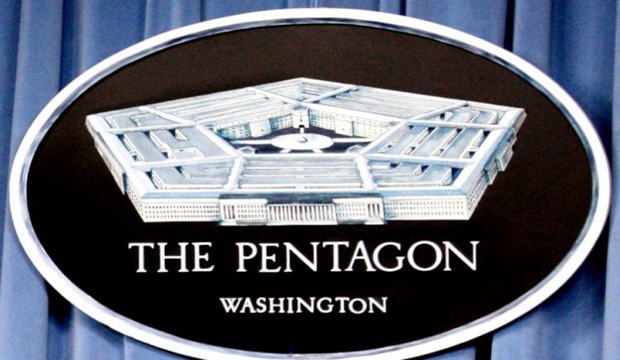
File photo of Pentagon logo in Washington. (Asharq Al-Awsat)
London, Asharq Al-Awsat—Washington is committed to a policy of non-coordination with Iran in the fight against the Islamic State of Iraq and Syria (ISIS), US officials have told Asharq Al-Awsat.
Speaking to Asharq Al-Awsat on the condition of anonymity, a senior US Defense Department official said: “The US is not coordinating with Iran in countering ISIS and in our activities in Iraq. What we are focused on is that those operating in Iraq are under the structure of the Iraqi government. We are very aware of Iran’s destabilizing role.”
The Pentagon official’s statement to Asharq Al-Awsat came on the eve of reports that Iran launched airstrikes on ISIS targets in Iraq this week, something that Tehran has denied. In a news briefing on Tuesday, Pentagon spokesman John Kirby publicly denied that the US is coordinating its military activities with Iran. “It’s the Iraqi air space and [Iraq’s] to deconflict. We are not coordinating with nor are we deconflicting with Iranian military,” Kirby said.
Commenting on reports of crimes committed by Iranian-backed militias in Iraq, the senior Pentagon official told Asharq Al-Awsat: “We take any claims very seriously and will work with the Iraqis to investigate fully what truth there is to this and we will take appropriate steps.”
The latest controversy surrounding the fight against ISIS in Iraq comes amid US preparations for the nomination of a new defense secretary to head up Washington’s anti-ISIS operations in the Middle East, replacing Chuck Hagel, who resigned from office last month. Hagel was one of Washington’s most senior officials familiar with Middle East affairs, having taken an interest in the region since being elected to the Senate in 1995 and subsequently serving on the US Senate Committee on Foreign Relations. His resignation raises further questions about differences within the US administration towards Washington’s policies in the Middle East, particularly over confronting ISIS.
In exclusive comments to Asharq Al-Awsat, US Deputy Assistant Secretary of Defense for Middle East Policy Dr. Matthew Spence stressed: “There is no daylight between the White House and Pentagon over our policy in our Middle East. US President Obama is very focused on a comprehensive approach to counter ISIS.”
US officials, particularly Defense Department officials, do not traditionally comment on differences of opinion between the White House and Pentagon. Administration officials continue to say that its anti-ISIS policy will focus on coalition building and assisting local forces to combat jihadists in Iraq and Syria.
“One of the most significant successes has been building a genuine coalition against ISIS in the region,” Spence said.
“The Defense Department’s role in countering ISIS is to deny safe haven to ISIS and to build up partnership capacity to take the fight to them,” he added, stressing that at the present time Washington has no plan to send US combat forces to Iraq.
While the US has already begun training Iraqi military forces to combat ISIS, Washington has warned that this will be a long-term process. “We need to understand that this doesn’t produce results overnight,” a senior Pentagon official speaking to Asharq Al-Awsat on the condition of anonymity said.
